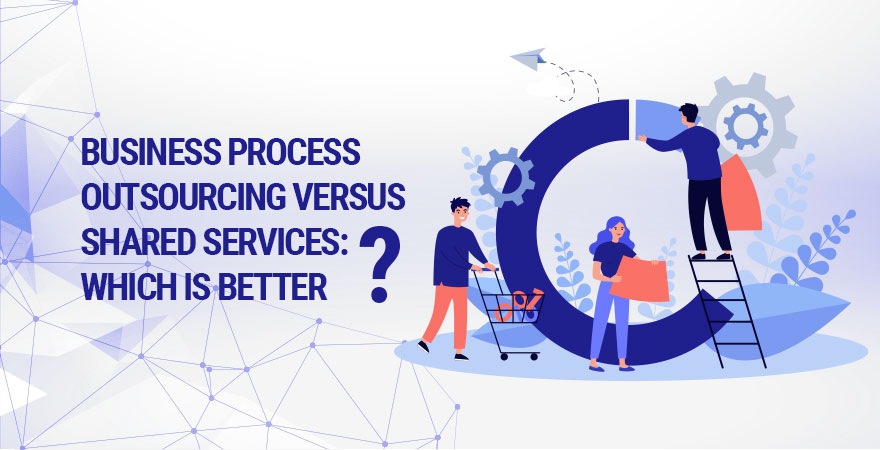Outsourcing and shared services are two competing trends that help organizations to get more value out of their business operations. In response to changing market trends business consultants perennially revisit the subject of Shared Services versus Business Process Outsourcing.

Outsourcing in Business
Many businesses from small to large enterprises outsource their operations from Data Entry to handling email security, Medical Billing, Accounts Processing, Software Testing, Customer Care, Budgeting and Forecasting. Companies decide to outsource functions for many reasons, some of which include reduced operational costs, quality Customer Care, trained staff, specialized skills, and equipment. Implementation of the BPO concept offers the following benefits:
Companies hiring services from BPO firms don’t need to worry about the hiring and training of staff. Outsourcing companies take over the headache of managing the team of agents with desired skills and expertise. Attrition and Turnover are also the outsourcing company’s concern and do not affect your performance metrics.
Customer Care Outsourcing is the best solution for multi-regional businesses which need to provide Customer Support in different parts of the world and in different time zones. It also means you can have 24-hour support services for your customers across the world with teams operating in shifts.
Outsourcing offers quick and optimized solutions which lead to improved efficiency, accuracy, and effectiveness of business operations. Outsourcing companies may also offer process improvement capabilities, which can help identify business expansion opportunities.
The overall cost of operations is reduced greatly when availing the services of an Outsourcing partner because the cost of living differs in different locations worldwide.
Shared Services
Shared services solutions place responsibility and liability on both involved organizations, instead of one. This model provides greater control to organizations in regards to what is shared. Many large multinational companies are adopting a shared services model in delivering Human Resources, IT, and Back Office functions. This transition is tied to many benefits related to both performance and cost. Some prominent positive outcomes of a shared services model include:
Reduction in operational costs by reducing the number of service employees, hardware and software systems.
Improvement in organizational performance by concentrating on managerial and technical expertise.
The shared services model is more responsive to changing business needs, as it is part of the same enterprise and has close relationships with business units or departments.
This model doesn’t require sharing information with outside third parties when done internally to enhance metrics.
Implementing a shared services business model also incurs risks such as lack of operational flexibility, increased complexity of systems, unclear service accountability, and unexpected implementation of cost escalation.
Which is Better?
Research reveals that a mixed approach towards outsourcing and shared services strategy is optimal. Many companies are motivated to externalize their support services to third parties, while at the same time others prefer to focus on their shared services model. As per research, the following trend has been observed:
89% of shared services belong to the Finance sector (Statista)
83% of outsourcing companies plan to outsource their IT security to an MSP in 2021 66% of larger companies will outsource more compared to smaller or mid-sized ones.
- 70% of the IT industry market worth will come from outsourcing; which is estimated at $413 Billion by the end of 2021 (capitalcounselor)
80% or more of Fortune 500 organizations have made use of shared services models in the US. (Deloitte)
57% of organizations using global business services are focusing on using automation and smart technology for efficient operations. (ssonetwork)
Both of the above-mentioned means of doing business incur their own benefits and risks, and each company has its own reasons for choosing a specific model. Generally, however, businesses seeking greater flexibility, multi-regional support, and access to technological innovations at low cost would benefit more from outsourcing than shared services. The reason is that countries like Pakistan, the Philippines, and China have developed their outsourcing industries to such a high level that their BPO firms can offer any type of technological solutions at a tremendously lower cost when compared to the implementation of a shared service model within the company.
Learn about Premier’s outsourcing model which operates on Right-Shoring ideologies; designing solutions customized to your business needs. We lift and shift your operations to the prime location, reducing your overhead costs while providing high-quality work. Visit our website to get a free limited consultancy or drop us a query at our contact page and we will get back to you at the earliest.
Author: Shafiq U.Rahman
Shafiq Rahman is Premier LLC’s Digital Marketing Executive. Prior to joining Premier LLC, Shafiq held several senior management positions in banking. He was CEO of a Citibank subsidiary and Regional Sales Head for Payment Product for North Asia, Global Head of Electronic Trade Products at Standard Chartered Bank, Head of Product Management at ABN Amro, and Regional Head of Trade Products at JP Morgan. He is experienced in relationship management, sales, product management, and operation management. He has extensive international experience and has lived and worked in eight countries.
 Skip to content
Skip to content






